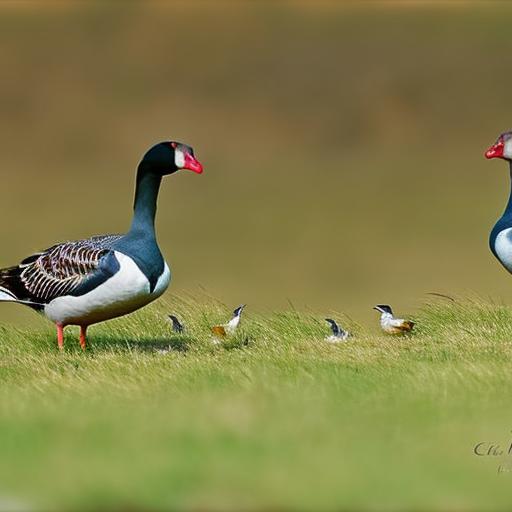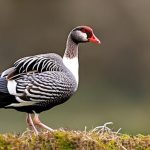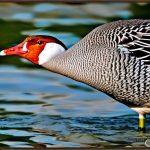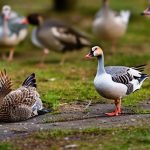Wild geese are a common sight in Ohio, with their graceful flight and distinctive honking sounds. However, before considering keeping wild geese as pets, it is important to understand the legal status of these birds in the state. Ohio has specific wildlife laws in place to protect its native species, including wild geese. This article will provide an overview of Ohio’s wildlife laws, the permits and licenses required to keep wild geese as pets, the risks and challenges associated with keeping them, and alternative ways to appreciate these birds without keeping them in captivity.
Understanding the legal status of wild geese in Ohio is crucial for anyone considering keeping them as pets. Ohio’s wildlife laws are designed to protect native species and maintain ecological balance. Wild geese are protected under these laws because they are considered migratory birds and fall under federal regulations as well. These regulations aim to ensure the conservation of these species and their habitats.
Key Takeaways
- Wild geese in Ohio have a legal status that prohibits keeping them as pets without proper permits and licenses.
- Ohio’s wildlife laws require individuals to obtain the right documentation before keeping wild geese as pets.
- Keeping wild geese as pets can pose health concerns and safety issues for both the geese and their owners.
- Proper care for wild geese includes housing, feeding, and general maintenance, but domestication is unlikely.
- Alternatives to keeping wild geese as pets include conservation efforts and wildlife sanctuaries.
- Legal consequences for keeping wild geese as pets in Ohio can result in fines and penalties.
- Ethical considerations should be taken into account when deciding whether to keep wild geese as pets.
- Making an informed decision about keeping wild geese as pets in Ohio requires understanding the legal and ethical implications.
Ohio’s Wildlife Laws: What You Need to Know Before Keeping Wild Geese as Pets
Ohio’s wildlife laws are governed by the Ohio Department of Natural Resources (ODNR) Division of Wildlife. These laws prohibit the possession, capture, or harassment of wild geese without the proper permits or licenses. Violating these laws can result in fines, penalties, and even criminal charges.
The consequences of violating Ohio’s wildlife laws can be severe. Depending on the offense, individuals may face fines ranging from a few hundred dollars to several thousand dollars. In some cases, individuals may also be required to complete community service or face imprisonment. It is important to note that ignorance of the law is not a valid defense, so it is crucial to familiarize yourself with Ohio’s wildlife laws before considering keeping wild geese as pets.
Permits and Licenses: Obtaining the Right Documentation for Keeping Wild Geese in Ohio
To keep wild geese as pets in Ohio, individuals must obtain the proper permits and licenses. The ODNR Division of Wildlife issues permits for the possession of wild animals, including wild geese. These permits are typically granted for educational or scientific purposes, wildlife rehabilitation, or for individuals who can demonstrate that they can provide appropriate care for the animals.
The application process for obtaining a permit to keep wild geese as pets in Ohio involves submitting a detailed application to the ODNR Division of Wildlife. The application must include information about the individual’s experience and qualifications, the intended purpose for keeping the geese, and details about the facilities and care that will be provided. The ODNR Division of Wildlife will review the application and may conduct an inspection of the facilities before granting a permit.
Obtaining the proper documentation is essential for keeping wild geese as pets in Ohio. Without the necessary permits and licenses, individuals may face legal consequences and potential harm to the geese.
The Risks of Keeping Wild Geese as Pets: Health Concerns and Safety Issues
Keeping wild geese as pets comes with inherent risks, both for the geese themselves and for their owners. Wild geese may carry diseases that can be transmitted to humans or other animals. These diseases include avian influenza, salmonellosis, and avian tuberculosis. It is important to take precautions to prevent the spread of these diseases, such as practicing good hygiene and ensuring proper veterinary care.
Safety issues can also arise when keeping wild geese as pets. Geese are large birds with powerful wings and beaks, and they can become aggressive if they feel threatened or cornered. They may bite or scratch their owners or other animals, potentially causing injury. Additionally, geese have specific dietary needs and require a suitable environment to thrive in captivity.
It is crucial to be aware of these risks before deciding to keep wild geese as pets. Proper education, training, and veterinary care are essential for ensuring the health and safety of both the geese and their owners.
Caring for Wild Geese: Housing, Feeding, and General Maintenance
Caring for wild geese in captivity requires a commitment to providing appropriate housing, feeding, and general maintenance. Geese need ample space to roam and access to water for swimming and bathing. They also require shelter from extreme weather conditions, such as heat or cold.
Feeding wild geese in captivity can be challenging, as their diet consists mainly of grasses, grains, and aquatic plants. It is important to provide a balanced diet that meets their nutritional needs. This may include commercial waterfowl feed supplemented with fresh fruits and vegetables.
General maintenance includes regular cleaning of the geese’s living area to prevent the buildup of waste and bacteria. It is also important to provide enrichment activities to keep the geese mentally stimulated and prevent boredom.
Proper care is essential for the well-being of wild geese in captivity. It is important to research and understand their specific needs before deciding to keep them as pets.
Training and Socialization: Can Wild Geese Be Domesticated?

Wild geese are not typically domesticated animals, and attempting to train them can be challenging. They have strong instincts for migration and may become stressed or agitated in captivity. While some individuals may be able to form a bond with their geese through patient training and socialization, it is important to understand that they will never fully lose their wild instincts.
Training wild geese requires time, patience, and a deep understanding of their behavior. Positive reinforcement techniques can be used to encourage desired behaviors, but it is important to avoid punishment or forceful methods that can cause stress or harm.
It is crucial to understand the limitations of domesticating wild geese before deciding to keep them as pets. They are best appreciated in their natural habitats or in wildlife sanctuaries where their needs can be met and their natural behaviors can be preserved.
Alternatives to Keeping Wild Geese as Pets: Conservation Efforts and Wildlife Sanctuaries
Instead of keeping wild geese as pets, there are alternative ways to appreciate these birds and support their conservation. Ohio is home to several wildlife sanctuaries and nature reserves that provide a safe haven for wild geese and other native species. These sanctuaries offer opportunities for observation, education, and even volunteer work.
Supporting conservation efforts is another way to make a positive impact on wild geese populations. This can include donating to organizations that work to protect and preserve natural habitats, participating in citizen science projects, or advocating for stronger wildlife protection laws.
By appreciating wild geese in their natural habitats and supporting conservation efforts, individuals can contribute to the preservation of these magnificent birds for future generations.
Legal Consequences of Keeping Wild Geese as Pets in Ohio: Fines and Penalties
Keeping wild geese as pets without the proper permits and licenses in Ohio can result in fines, penalties, and potential legal consequences. The specific fines and penalties vary depending on the offense and can range from a few hundred dollars to several thousand dollars. In some cases, individuals may also be required to complete community service or face imprisonment.
It is important to understand that ignorance of the law is not a valid defense. Violating Ohio’s wildlife laws can have serious consequences, both financially and legally. It is crucial to obtain the proper permits and licenses before considering keeping wild geese as pets.
Ethical Considerations: Is it Right to Keep Wild Geese as Pets?
Keeping wild geese as pets raises ethical considerations that should be carefully considered before making a decision. Wild geese are migratory birds with complex social structures and specific behavioral needs. Keeping them in captivity may cause stress, frustration, and a loss of their natural instincts.
Additionally, wild geese play important roles in ecosystems as seed dispersers and contributors to nutrient cycling. Removing them from their natural habitats can disrupt these ecological processes and have negative impacts on the environment.
It is important to consider the potential harm that may be caused to wild geese in captivity and weigh it against the desire to keep them as pets. Supporting conservation efforts and appreciating wild geese in their natural habitats may be a more ethical way to enjoy these birds.
Making an Informed Decision About Keeping Wild Geese as Pets in Ohio
In conclusion, understanding the legal status of wild geese in Ohio is crucial before considering keeping them as pets. Ohio’s wildlife laws protect native species, including wild geese, and violating these laws can result in fines, penalties, and potential legal consequences.
Obtaining the proper permits and licenses is essential for keeping wild geese as pets in Ohio. The application process involves submitting a detailed application to the ODNR Division of Wildlife, which will review the application and may conduct an inspection of the facilities before granting a permit.
Keeping wild geese as pets comes with inherent risks, including health concerns and safety issues. It is important to provide appropriate care, including proper housing, feeding, and general maintenance. However, it is crucial to understand that wild geese are not typically domesticated animals and may never fully lose their wild instincts.
There are alternative ways to appreciate wild geese without keeping them as pets, such as supporting conservation efforts and visiting wildlife sanctuaries. By making an informed decision and considering the ethical implications, individuals can contribute to the preservation of these magnificent birds for future generations.
If you’re curious about keeping wild geese as pets in Ohio, you may also be interested in learning about the dietary needs of quails. Poultry Wizard has an informative article on what vegetables quails eat, which can provide valuable insights into the nutritional requirements of these fascinating birds. To read more about this topic, check out their article here.
Meet Walter, the feathered-friend fanatic of Florida! Nestled in the sunshine state, Walter struts through life with his feathered companions, clucking his way to happiness. With a coop that’s fancier than a five-star hotel, he’s the Don Juan of the chicken world. When he’s not teaching his hens to do the cha-cha, you’ll find him in a heated debate with his prized rooster, Sir Clucks-a-Lot. Walter’s poultry passion is no yolk; he’s the sunny-side-up guy you never knew you needed in your flock of friends!







